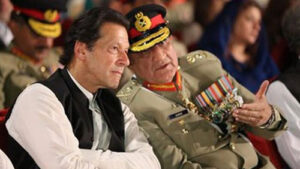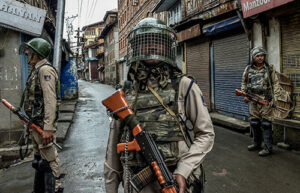For the past few months, Prime Minister Imran Khan has stopped knocking his Indian counterpart, Narendra Modi, by referring to him as the ‘Hitler of the East’ or comparing the right-wing Hindu nationalist organisation, the RSS (Rashtriya Swayamsevak Sangh), with Nazis and fascists. And it is not just the civilian leadership, which has halted the anti-India rhetoric; Pakistan’s top military officials, too, in background media briefings are trying to shape public opinion in favour of taking a “strategic pause” on the Occupied Jammu & Kashmir dispute. Additionally, they are advocating the need to improve relations with India, and listing the benefits of trade and cooperation.
This change of heart among Pakistan’s key decision-makers has occurred even as New Delhi continues to push its oppressive policies in Occupied Kashmir and categorically rejects revocation of its August 5, 2019 unilateral steps, which abolished the special Constitutional status, or limited autonomy, of this Muslim-majority region and unveiled plans to force demographic changes there. Yet, there has been a visible and stark climbdown by Pakistan on Kashmir — from the position of “no talks with India until it scraps its August 5, 2019 steps” to that of making intangible pleas to New Delhi to create a conducive atmosphere for talks.

But while Pakistan continues to make repeated peace overtures — just as it used to do in the pre-August 5, 2019 days — at least publically, there has been no response from the Modi Government.
A senior Pakistan Army official, in a much-publicised background briefing, claimed that the offer for the recent engagement came from India in December 2020, which paved the way for the military-driven, backchannel talks. This engagement resulted in the restoration of ceasefire along the Line of Control (LoC) in the divided Jammu & Kashmir region in February, and re-positioning on the Pakistani side. In a nutshell, in this backchannel engagement — conducted at the intelligence agencies’ level of the two countries — India appears to be setting the agenda, pace and direction of the talks.
The biggest advantage for India is that it is conducting the backchannel negotiations from a position of strength — i.e. after changing the status of occupied Kashmir. By hook or by crook, Occupied Kashmir has already been made a part of India’s union territory and New Delhi is calling the shots through extremely high-handed measures in this disputed territory.
India’s decision to reengage Pakistan, after changing the status-quo in Kashmir, should also be seen as a part of its efforts to manage the fallout of its decision. In statecraft, whosoever dictates on the ground, also dictates at the negotiations table. If one concedes space, it can never be taken back simply through negotiations.
So when, in any background media briefing, participants are informed that India has offered to talk on all outstanding issues, including Kashmir, it hardly gives any assurance or confidence to Pakistanis. As matters stand today, New Delhi has unilaterally wriggled out of all bilateral agreements with Pakistan on Kashmir, as well as violated and thrown away UN resolutions by merging the disputed region into India. Any resumption of formal talks in the current situation would be used by India to legitimise its illegal steps in Kashmir and weaken, divide and confuse the freedom movement.
The gravest cause of concern remains that no explanation was given, even in the background briefing, on what India had offered to discuss on Kashmir — its August 5, 2019 measures, the dispute in the context of the UN resolutions, the so-called bogey of Pakistan’s interference in the occupied region — or lay claim on Azad Jammu & Kashmir and Gilgit-Baltistan. This vagueness about the agenda of the talks on Kashmir was evident from whatever little got reported after the briefing.

One thing, however, should be clear. If and when formal bilateral talks between the South Asian neighbours resume, they would not be held in the context of similar exercises done in the past, as India has completely changed the ground reality and context of these engagements. As far as India is concerned, the issue of granting the right of self-determination to Kashmiris is off the table. And Pakistan, at the most, would be engaged in the futile exercise of asking India, for the sake of asking, to revoke its August 5, 2019 measures.
Going by the admission of a top Pakistani official in the briefing, that India has “proposed that the countries start talking on all outstanding issues side-by-side instead of lumping them together in the composite dialogue,” and Pakistan’s decision to agree to explore all options, should also be seen as a huge win for India. This simply means that while the current statusquo will be maintained on Kashmir, on other issues, for example trade and the so-called cultural ties, progress can be made. With the trade balance already hugely tilted in India’s favour and Bollywood keen to re-enter the Pakistani market, this would be a win-win scenario for India, as only Islamabad would be forced to make one-sided adjustments, accommodations and concessions, including on the core issue of Kashmir.
“India was always interested in engaging Pakistan for normalisation, minus resolution of disputes,” says a former Pakistani ambassador, requesting anonymity. “In the composite dialogue, there were eight issues taken up side by side… By giving up the composite dialogue, you are giving up a comprehensive solution of inter-connected issues.”
“The ambassador maintains that abandoning the composite dialogue would be a huge climbdown by Pakistan… You are saying that the objective of the current engagement is to ease the sufferings of the people of Occupied Kashmir, and in the same breath you claim that Pakistan’s principled position won’t be sacrificed. But for all practical purposes, this sacrifice has already been made.”
Former diplomats are concerned that the basis of taking a strategic pause in hostilities has not been explained, and further that this backchannel engagement has sent all the wrong signals, especially to Kashmiris.
If the past is any guide, even at the best of times in Pakistan-India relations, bilateralism failed to get even the so-called low hanging fruits, including the disputes over Sir Creek and the Siachen Glacier, mainly because of Indian reluctance. To expect that Pakistan would be able to gain anything from bilateralism now, when India is under no international or domestic pressure, remains extremely delusional.
Security and international relations experts are of the view that the content of the high-profile briefing shows that there is a lot of desperation and undignified eagerness from the Pakistani side to engage with India. Participants at the briefing were told that economic weaknesses are forcing Pakistan to reposition itself vis-a-vis India and take a strategic pause on Kashmir.
“I can only say that the briefing has revealed too much, including Pakistan’s desperation to ease tensions with India because of its economic conditions… this has weakened Pakistan’s hand, both in the backchannel negotiations and any formal future talks with New Delhi,” remarked another diplomat. “This is nothing less than a disaster in diplomacy.”
The briefing is also been seen in the context of Army Chief General Qamar Javed Bajwa’s March 18 address at the first-ever Islamabad Security Dialogue, in which he said that “it is time to bury the past and move forward,” in the Pakistan-India context. These remarks drew restrained criticism from several quarters as they were seen as undermining the Kashmir issue.
Observers, however, say that Pakistan’s civil and military leaders — apparently on the same page on this issue — are, repeatedly, committing the same mistake of pinning hopes on Modi for a solution to the Kashmir dispute. When Modi was bidding for his second term in office, Pakistani leaders, including the prime minister, were saying that as a strong leader Modi can take big decisions. Again, in the latest briefing, similar views were expressed, ignoring the fact that, as a strong leader, Modi has already taken bold decisions, but they were intended to solve the Kashmir dispute unilaterally in India’s favour.
Why do Pakistani leaders tend to forget that while a strong leader can make peace, he can also wage wars or opt for unconventional solutions to serve his national interests, as has been done by Modi in Kashmir’s case. Modi took controversial, yet bold and decisive actions in Kashmir. Pakistani leaders, on the other hand, only reacted sheepishly by initially paying lip-service to the Kashmir cause, and now they are surrendering even their symbolic tough posturing.
From one extreme of dubbing Modi as “Hitler” and “fascist” to the other extreme of pinning hopes of peace on the same man — known as ‘the butcher of Gujrat’ and seen as a sworn enemy of Pakistan and Muslims — reflects the lack of a measured approach, failure to grasp the enemy’s designs and the defeatist mindset of the current civil and military leaders of Pakistan.
Even prior to his move of revoking the special status of Occupied Kashmir — an election promise of the Bhartiya Janta Party (BJP) — Modi built pressure on Pakistan through a series of steps, from the claims and threats of staging false-flag operations inside Azad Kashmir to sending Indian aircraft to Balakot — deep inside Pakistan — in February 2019. Although Pakistan countered the Indian aggression effectively by downing two enemy aircraft, Modi did manage to redefine the redlines and establish the fact that India remains open to the possibility of active hostilities and limited or big-scale military conflict. By the time, India moved to assimilate Occupied Kashmir in August 2019, Pakistan’s civil and military leadership made it clear that they wanted to avoid escalation with India at any cost. Prime Minister Imran Khan’s admission in Parliament, following India’s August 5, 2019 steps, that war is off the table, weakened Pakistan’s hand further. This mantra of “war is not a solution to any problem” is being repeated since then — by our prime minister and foreign minister to the top military leaders now.
Top security and diplomatic officials say that while responsible countries stay away from war-mongering, at the same time they don’t say that war is not an option, even when their core national interests are being hurt. Silence and ambiguity on this front remain a better option than making categorical announcements of “no to war,” which removes pressure from the enemy and allows it to take more aggressive measures – as India has done.
Former military ruler, President General Pervez Musharraf, handled the pressure much better and made a more substantive backchannel bid through trusted aide Tariq Aziz — a non-military person — which had four elements for the solution of the Kashmir dispute, including making the LoC meaningless for trade and people- to-people contact, and reducing the size of the troops. This easing of tension was aimed at taking up the issue again at an appropriate time.
But the current backchannel is being done when India has already changed the rules of the game by assimilating Occupied Kashmir. Another issue is carrying out the backchannel talks through intelligence officials, who may be excellent in information-gathering, but have a narrow vision and can hardly be a substitute for diplomats.
This latest peace bid appears to be a half-baked individual-driven effort from the Pakistani side, which is likely to lead to a reaction and backlash in the country — sooner or later. But by that time, immense damage will have been done to the Kashmir cause and Imran Khan, being the prime minister, will emerge as the face of this debacle — a fallout which he can hardly afford. And this was evident from the way his cabinet rejected the ECC (Economic Coordination Committee) decision of opening up trade with India.
Observers also remark that any briefing on relations with India should not have come from the military camp, as it has exposed the powerlessness and irrelevance of the civilian government.
According to a retired major-general of the Pakistan Army, who also asked not to be named, the policy of appeasement never works and it would only damage the Kashmir cause. “Pakistan is being forced to accept the LoC as a permanent border at the behest of the United States, which wants to ease pressure on India. One heart-breaking development is that the Pakistani leadership has agreed to scale-down its position just for talks for the sake of talks, as India is all out to change even the demography of Kashmir. The real issue of the right to self-determination of the Kashmiris is no longer to be seen on the radar.”
In the briefing, the senior official also said that India wants to avoid a two-frontal war, given its tensions with China. “This was the time to intensify pressure, but we are doing just the opposite… there is a genuine fear now that the US-led camp wants to disturb and disrupt the CPEC (China-Pakistan Economic Corridor) and is forcing Pakistan to mend fences with India by sacrificing its principled position.”
Observers maintain that there is now a dichotomy in Pakistan’s position. Till a few months back — November 2020, to be precise — this government was presenting a dossier to the United Nations, revealing India-sponsored terrorism in Pakistan. But now there is a sudden change in its position.
“What is the hurry? If you can’t fight, at least do not yield [to pressure] and continue the political, diplomatic and moral support of Kashmiris just like in the past… next the United States and its strategic partners would be demanding that Pakistan cap, and then give up its nuclear weapons,” the retired major-general said. “This Army Chief and the Prime Minister are here for the next two to two-and-a half years… and they should not sacrifice the country’s long-term national interests because of momentary weakness.”
Any so-called peace bid with India that goes against the aspirations of the people of Kashmir and Pakistan, and without taking the parliament into confidence, is bound to backfire and fail. History will judge the duo of Prime Minister Imran Khan and Army Chief General Qamar Javed Bajwa harshly if political expediency, one-sided compromises and opportunism dominate their decision-making while dealing with India. Peace will continue to elude Pakistan and India until the Kashmir dispute is resolved in line with UN resolutions and according to the wishes of the Kashmiri people.

The writer is a senior journalist and managing editor, Narratives.




Insightful article. I pay my greatest regard for presenting this excellent piece. There was Late Ashraf Sehrai on whose grave slogan was raised that Kashmiris are Pakistanis and Pakistan is ours. What Pakistani military and civilian leadership s doing is simply committing betrayal. I cannot believe what kind of policy is this: What is legally our is Yours India and what is ours is also yours. Kashmiri is legally part of India. India has no historical connection with Kashmir. Pakistan must not live any illusion that armed Hindu settler colonies will show up all along border with Azad Jammu and Kashmir and Ladakh. Sooner or later there will be intrusion into Azad Kashmir and GB.
Insightful article. I pay my greatest regard for presenting this excellent piece. There was Late Ashraf Sehrai on whose grave slogan was raised that Kashmiris are Pakistanis and Pakistan is ours. What Pakistani military and civilian leadership s doing is simply committing betrayal. I cannot believe what kind of policy is this: What is legally our is Yours India and what is ours is also yours. Kashmiri is legally part of Pakistan. India has no historical connection with Kashmir. Pakistan must not live any illusion that armed Hindu settler colonies will show up all along border with Azad Jammu and Kashmir and Ladakh. Sooner or later there will be intrusion into Azad Kashmir and GB.